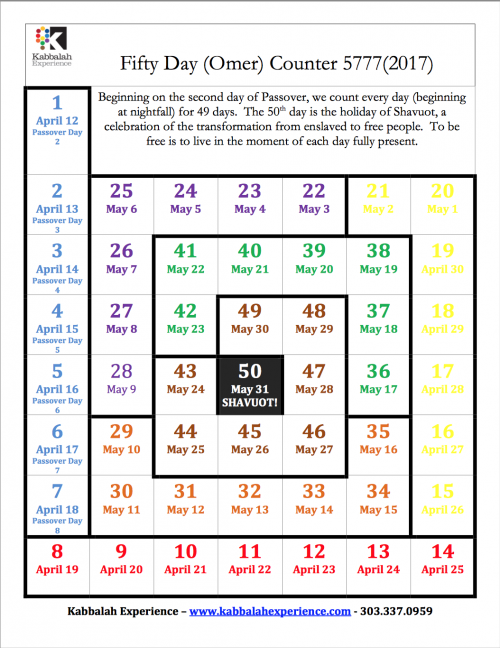 Week 2 Gevurah: Determination and Focus
Week 2 Gevurah: Determination and Focus
This second week of the counting of the Omer is connected to the Sefirah of Gevurah which means strength.
In Kabbalah it is taken as the strength to set limits. As Gevurah sits opposite Chesed (the Sefirah of unbounded love) Gevurah is often interpreted as love through saying, “No.”
In other words, setting limits can also be a way to express love. As we are using the counting of the Omer this year to change ourselves—our learning about Gevurah reflects the intention of this Sefirah as “determination” to change.
Next week, the Sefirah of Tiferet will present the opportunity for making a plan for change. Our preparation for change during the first week of the count focused on the love we have for ourselves. We looked at how love is an important (starting) aspect of change—love for self is requisite for change to have a lasting impact.
If love is one “wing” for change then determination is the other “wing.”
As our focus is on change—and the following week (Tiferet) will be when we set the stage for change by creating the blueprint/plan for change—this week is still preparation for the plan of change. We now move from contemplating the feelings of the love of self and others (the first week of Chesed) as a motivation for change to the determination and discipline to change. Gevurah in this way represents our ability to step back, set limits, and create space for change. “One has to be determined to change.”
Where were the Hebrew slaves this week? They had crossed the sea and now were in the desert without water and food. The exhilaration of freedom was shifting into the realities of a new life which would require an intense determination to push on, to stay on course and not falter and give up on their commitment to be a free people.
You have a number of weeks until the count of the Omer reaches the week of Malchut itself (if you are ready to change already don’t let the count deter you!).
Day 8: Chesed in Gevurah—Is there loving kindness in determining to change? Chesed is always about expressing love—and love takes on many forms including being focused and when appropriate, setting limits. Whatever change you may be considering keep in mind both your determination to change and that its motivation is based in love.
Day 9: Gevurah in Gevurah —Gevurah is about focus and determination and as we suggested last week, the challenge to that is what will others think, how will this affect others and will that cause me to lose or strengthen my determination to change? So while I can always choose to love—I need to be firm in my commitment—a boundary that is set needs to be a consistent and determined boundary. As we look at changes we have to contemplate the determination of boundaries and the boundaries of (our) determination to see the change through.
Day 10: Tiferet in Gevurah —Tiferet is the blueprint for change and how your plan for change takes into account the need for balance—both internally and with others. Keep in mind that as you reflect on your determination this week it will impact the shape (boundaries) of your plan. How far and wide will the change be? When is the change best timed for? And do you need and have support? This week’s contemplation is not yet about the specifics of the plan but rather about examining if the plan will actualize your determination. You may need to be already thinking of some of the elements of the plan for change so you can have a ‘smell test’ of your determination.
Day 11: Netzach in Gevurah —Netzach is about trust in yourself that you can overcome any thoughts or emotions that are stirred up by your plan and remain determined to create change. Netzach is about trust in the self to overcome obstacles and these are often external. One of the big issues in changing one’s self is: I have tried this before (and not changed) or how can I change now because I have let this go on for so long? These attitudes are internal obstacles we have to overcome in order for us to remain determined in our resolve to change.
Day 12: Hod in Gevurah —Hod is about acknowledging limitations. Perhaps there was a moment to act already upon your determination but you faltered, your resolve was not strong enough. It is ok to acknowledge that change is not easy and that you may not have had the courage or unflinching determination to change. We may also need to acknowledge that there are some obstacles to our determination that we may not be able to overcome (now). Fear of change may hold us back from the full change we might want—some change though is better than none. Remain determined to make some progress, if not a complete change.
Day 13: Yesod in Gevurah —Yesod is the foundation on which change can will be actualized. Yesod is the final filter in which the test of your sincerity is measured by the degree of integrity your change reflects—the change in me will express my truth—the truth I want to be. Ultimately, Yesod is calling us to attend to ourselves and be willing to express the whole truth and nothing but the truth.
Day 14: Malchut in Gevurah — This final day of the second week sets the stage for the week of Tiferet when the contemplations on both love for the self and determination together shape the plan for change. Malchut always refers to manifestation, so, for today, it is simply manifesting your determination—expressing it to others and to your self, rehearsing it to enhance your determination about the plan for change.


 Week 2 Gevurah: Determination and Focus
Week 2 Gevurah: Determination and Focus






0 Comments